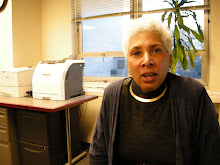THE
TEACHER
How to learn Jazz music is a unique decision needing individual
guidelines that cater to personality styles of learning. There is no one path
toward accomplishment. No single continuum that outlines the broad spectrum
that is Jazz. As there is no one level of mastery. Here are some choices:
·
Transcriptions (your own) from recordings
·
Reading published transcriptions
·
Composing from charts in Real Book, etc.
·
Listening then reproducing a teachers’ riffs:Barry
Harris
·
Studying Jazz theory textbooks :An Approach to
Comping Jeb
Patton
·
Private piano lessons
The levels of mastery include the above that can
be summaries as functions of the brain, the eyes, the ears and the fingers. Who
trains the feeling?
There is a unique challenge for adults to learn. There
is also a unique challenge to the teaching of adults. When I reentered my Hanon
studies more that a year ago I was not thinking of Jazz. I was hearing Mozart.
I’m still hearing Mozart even after
this first year studying Jazz. I am still playing classical piano and Hanon
exercises.
When Dan Kaufman sits in the front of our
classroom at Jazz Mobile Saturday Workshop, it is a concession on his part
having agreed to be the TEACHER.
The style and methodology he uses is
non-hierarchial and interactive. One gets the sense that he is merely
contributing ideas to the study of music not espounding doctrines or even
theories. But that sense is a mistake.
He gives suggestions that are accurate yet terse. However, a suggestion
is an invitation. This is the ambience for success. It is only after you try
these suggestions that you yourself will decide whether this is a useful theory
or not.
In psychotherapy the discussion is simply a
mirror of the thoughts verbalized to the therapist. The therapist may say, “Is
this you?” And the therapeutic work
is with what has just been said. So it is when DK teaches privately or in a
classroom setting. Whatever question we ask or whatever statement or
observation is made or whatever tune is performed DK works from that point
forward. This is a very efficient use of a student's time. It is a guarantee that we will get
something out of this class. It is the propellent for at home study. This is no
minor skill for a professor. It is
the exhibition of a broad mastery of the music called Jazz, specifically piano
performance solo or ensemble. The compensation and acknowledgment of this is
inversely proportional to the gift to the student's experience.
The individual quidelines for learning Jazz are
constructed by what the student has mastered and is ready to progress toward.
In the classroom we are at various points in this continuum. It is chaotic! Teaching
requires repeating, restating and rephrasing an explanation. DK manages to
describe the numerical chord structures in multiple lectures without an
attitude of, "Haven't I gone over this before?" And we take notes
because we always hear a little something new.
When DK
abruptly shifts to an analogy my thinking shifts too. This happens when
one level of explanation is not utilized by a listening student or when a restatement
is indicated. Suddenly our listening is jarred to a new location: a baseball field,
for example. It maybe a brain hemispheric shift. The movement is from a (left) linear attempt to comprehend to
a (right) feeling sense of understanding.
It is a noticable change. It makes us laugh to try to compare the 'meaty' register on
the keyboard to the 'sweet spot' of a baseball bat.
After we perform a piano piece DK always asks the
students, "What did you like about the piece?" before he gives his
comments. He listens to us. In this classroom filled with adult students, with
our large egos, DK's persona is diminutive. This bring a generous helping of
creative energy into the classroom. With his comments come a precision of
language. We students, on the other hand search for something profound to say;
but we always say something. Then DK plays his impromtu version the piece, smothering
our infantile performance. Even after he has said, "I don't know that
piece."
The only time DK's countenance falters is when
the facility fails to facilitate.
